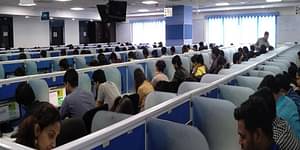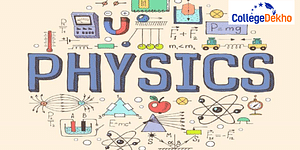BSc Statistics Syllabus & Subjects 2024
BSc Statistics Syllabus & Subjects Overview
The BSc Statistics syllabus equips candidates with the statistical comprehension and analytical skills necessary to manage a wide range of statistical applications. The rigorous study of probability, logic, statistics, mathematics, and proofs is covered in this three-year bachelor's degree course. Regression, data modelling and analysis, mathematical reasoning, and other BSc Statistics subjects are covered in this degree along with extremely advanced concepts. The course curriculum for BSc Statistics incorporates core, elective, and laboratory subjects to provide students with an exhaustive understanding of the fundamental mathematical, quantitative, and statistical concepts.
The BSc Statistics syllabus covers Applied Statistics, Algebra, Calculus, Probability and Statistical Methods, Survey Sampling, Real Analysis, Numerical Analysis, and Statistical Inference as its core disciplines. Research projects, statistical software, and programming languages are all crucial components of the course that is taught in many universities. This kind of learning will provide a strong basis for higher-level courses such as MSc Statistics. The BSc Statistics course curriculum provides students with hands-on problem-solving skills, seminars, project submission, and more. This page discusses everything students need to know about the detailed semester-wise syllabus, core and elective subjects, best reference books, course structure, etc. about BSc Statistics.
Table of Contents
- BSc Statistics Syllabus & Subjects Overview
- BSc Statistics Year-wise Syllabus
- BSc Statistics Subjects
- BSc Statistics Common Subjects for All Semesters
- BSc Statistics Elective Subjects
- BSc Statistics Lab Subjects
- Specializations Offered under BSc Statistics
- BSc Statistics Syllabus for Distance Programs
- BSc Statistics Entrance Exam Syllabus
- BSc Statistics Important Books
- BSc Statistics Course Structure
- FAQs about B.Sc - Statistics Syllabus
BSc Statistics Year-wise Syllabus
The three-year, six-semester BSc Statistics curriculum is comprehensive and diverse and involves both theoretical and practical research. The general B.Sc. Statistics syllabus is divided into the following semesters:
Subjects under BSc Statistics 1st Year
| Semester I | Semester II |
|---|---|
| Descriptive Statistics I | Descriptive Statistics II |
| Calculus | Sampling Distributions and Statistical Infer |
| Inequalities | Differential Calculus |
| Demoivre’s theorem | Review of Differential Equations |
| Probability and Probability Distributions I | Probability and Probability Distributions II |
| Linear Algebra and Population Statistics | Mathematical Analysis |
| Equations theories, Fundamental theorem of algebra and its consequences | Review of Integration and Definite Integrals |
Subjects under BSc Statistics 2nd Year
| Semester III | Semester IV |
|---|---|
| Linear Algebra | Statistical Methods |
| Probability Theory | Index Numbers |
| Random Variables | Mathematical Finance |
| Expectation of Random Variable and its Properties | Demand Analysis |
| Demography and Vital Statistics | Linear Models |
| Statistical Computing and Numerical Analysis Using C Programming | Statistical Quality Control |
| Design of Experiments and Sample Survey Methods | Programming Language C |
| Measures of Location (or Central Tendency) and Dispersion | Utility and Production Functions |
| Multivariate Analysis and Large Sample | Time Series Analysis and Sample Survey Methods |
| Official & Economic Statistics and Statistical Quality Control | Statistical Inference-I and Sampling Distributions |
| Sampling Distributions | Index Numbers and Time Series Analysis |
| Mathematical Analysis | Time Series |
| Survey Sampling and Indian Official Statistics | - |
Subjects under BSc Statistics 3rd Year
| Semester V | Semester VI |
|---|---|
| Statistical Inference-II | Design of Experiments |
| Sample Surveys | Numerical Analysis |
| Basic Sampling Methods | Inverse Interpolation |
| Stratified Random Sampling | Numerical Integration |
| Linear Models and Regression | Multivariate Analysis and Nonparametric Methods |
| Stochastic Processes and Queuing Theory | Data Interpretation |
| Statistical Computing Using C/C++ Programming | Mathematics |
| Sampling Theory, Time Series, Index Numbers and Demand Analysis | Design of Experiments, Vital Statistics, Official Statistics and Business Forecasting |
| Statistical Quality Control and Reliability | Operations Research |
| Biostatistics – I | Biostatistics – II |
| Actuarial Statistics – I | Actuarial Statistics – II |
| Fundamental Theorem of Algebra and its Consequences | General Linear Models |
BSc Statistics Subjects
The most important subjects and topics covered in all four semesters of the BSc Statistics course syllabus at the top colleges of India are as follows:
| BSc Statistics Subject | Description | Topics Covered |
|---|---|---|
| Probability Theory | Probability theory is an area of mathematics that examines random events. A random event's outcome cannot be predicted before it happens, although it could take any of several different forms. The final outcome is thought to have been determined by chance. |
|
| Calculus | It is the mathematical study of continuous change. It has two branches: Differential Calculus, that deals with the calculation of instantaneous rates of change, and, Integral Calculus, that is concerned with the summation of infinitely many small factors to determine some whole. |
|
| Descriptive Statistics | You will learn the fundamental concepts of data description through descriptive statistics. Three main categories of descriptive statistics exist: The distribution relates to how frequently each value occurs. The primary trend is related to the value averages. The dispersion or variability refers to how evenly distributed the results are. |
|
| Statistical Inference | The technique of analyzing the outcome and drawing conclusions from data with random variation is known as statistical inference. It can be segregated into two areas: estimation and hypothesis testing. |
|
| Probability Analysis | Numerous probability issues, including sample spaces, independence, continuous probability, distributions, etc., are covered in depth throughout the BSc Statistics course. |
|
BSc Statistics Common Subjects for All Semesters
The BSc Statistics course subjects that are embedded in all four semesters of the bachelor’s degree program are as follows:
| Calculus | Algebra | Bioinformatics |
|---|---|---|
| Decision Analytics | Computational Biology | Financial Mathematics |
| Statistical Biology | Quantitative Finance | Data Science |
| Probability Theory | Numerical Analysis | Elementary Inference |
| Descriptive Statistics | Quantitative Analysis | Probability Distributions |
| Statistical Methods | Probability Theory | Vectors and Matrices |
| C or C++ Programming | Mathematical Analysis | Statistical Quality Control |
| Proofs and Problem Solving | Pure and Abstract Mathematics | Statistics and Applied Mathematics |
| Linear Algebra and Population Statistics | Mathematical Methods and Probability Theory | Sampling Distributions and Statistical Inference |
BSc Statistics Elective Subjects
The elective subjects that must be taken along with the core subjects in a BSc Statistics program have been mentioned below:
| BSc Statistics Elective Subject | Syllabus |
|---|---|
| Macroeconomics |
|
| Sociology |
|
| Physics |
|
| Geology |
|
| Agriculture Science |
|
BSc Statistics Lab Subjects
The BSc Statistics syllabus covers a wide range of topics, including Probability Theory, Quantitative analysis, and other statistical concepts. The course curriculum, which spans three years and/or six semesters, covers key topics including Demography, Biostatistics, Actuarial Statistics, and so on. The following is a discussion about the year-wise laboratory subjects for BSc Statistics.
First-Year BSc Statistics Lab Subjects
The following pointers list the first-year lab BSc Statistics subjects:
- Construction of questionnaires and schedules
- Descriptive Statistics and Probability
- Inference
- presentation of data using different diagrams and graphs
Second-Year BSc Statistics Lab Subjects
The following pointers list the second-year lab BSc Statistics subjects:
- Computation of different measures of Central Tendency
- Sampling Theory and Time Series
- Statistical Data Analysis Using EXCEL
- Test of hypothesis
Third-Year BSc Statistics Lab Subjects
The following pointers list the third-year lab BSc Statistics subjects:
- Chi-square and F distributions
- Simple correlation and regression
- SPSS
- Statistical Data Analysis Using R Programming
Specializations Offered under BSc Statistics
In a BSc Statistics program, you can select from a number of concentrations to achieve advanced and subject-specific expertise. The following is a summary of some of the specializations:
| BSc Statistics Specialization | Description | Topics Covered |
|---|---|---|
| Decision Analytics | In order to handle difficult, vaguely defined, large-scale decision-making challenges that arise in policy and industry, this course provides modelling paradigms and computational methods. It deals with making quantitative decisions, optimal design, efficient resource management, and economic effectiveness. |
|
| Data Science | Data science makes use of a range of tools, methods, scientific techniques, and algorithms to draw conclusions from both structured and unstructured data. Students will graduate from the program with a thorough understanding of the many methodologies, approaches, aptitudes, and tools required to deal with corporate data. |
|
| Bioinformatics | The computer-aided analysis of biological data is known as bioinformatics. Computational biology is the intersection of data science and life science, which uses computer-aided data capture, storage, and processing techniques to examine complex biological data sets. |
|
| Quantitative Finance | It involves evaluating and forecasting markets using statistical and quantitative techniques, and using programming tools to create solid investing plans. The primary focus is on developing mathematical models for evaluating and managing financial systems, potential risk, and trading timing. |
|
| Statistical Biology | The statistical techniques utilized in biological and medical research are introduced in this course. Regression and correlation approaches, elementary probability theory, fundamental ideas of statistical inference, and sample size estimation are the main topics. |
|
| Statistics and Applied Mathematics | In a wide range of disciplines, particularly in engineering, medicine, physical and biological sciences, and social sciences, applied mathematics and statistics are the use of mathematical methods and reasoning to solve real-world problems related to science or decision-making. |
|
| Bioinformatics | The application of computation and analysis tools to the collection and evaluation of biological data is referred to as bioinformatics. It is a multidisciplinary field that integrates biology, mathematics, computer science, and physics. |
|
| Financial Mathematics | The use of mathematical techniques to solve financial issues is known as financial mathematics. It uses techniques from economic theory, stochastic processes, statistics, and probability. |
|
BSc Statistics Syllabus for Distance Programs
A distance BSc Statistics program has been created for students who, due to financial constraints and work commitments, are unable to participate in a full-time bachelor’s degree program. The detailed BSc Statistics course syllabus for the distance program is provided below:
| Estimation: Problem of estimation; point estimation, interval estimation, criteria for a good estimator, unbiasedness, consistency, efficiency and sufficiency with examples | Testing of Hypothesis: Statistical hypothesis, Null and alternative hypothesis, simple and composite hypothesis, two types of error, critical region, power of test, level of significance |
|---|---|
| Complete enumeration Vs sample enumeration; advantages and disadvantages of sample survey, objectives of sampling, principal steps in a sample survey, limitations | Meaning of Stratification, Method of Stratified sampling and its advantages and disadvantages |
| Systematic sampling, Cluster sampling with equal and unequal cluster sizes, estimation of mean and variance | Analysis of variance for one way and two way classification, basic principles of design of experiment, concept and analysis of completely randomized design, randomized block design, advantages and disadvantages of these design |
| Demographic Methods: Source of demographic data-census, register, ad hoc survey, hospital records, demographic profiles of Indian census | Economic Statistics; Index number its definition, application of index number, price relative quantity or volume relative, link and chain relative problem involved in computational of index numbers, use of averages, simple aggregate and weighted averages methods |
| Laspeyres, Paasche’s and Fisher’s index number, consumer price index | Static laws of demand and supply, price elasticity of demand, analysis of income and allied size distribution, Pareto distribution, graphical test, fitting of pareto law, lognormal distribution and its properties, Lorenz curve and Gini's Coefficients |
| Time series Analysis:- Economic time series, its components, illustration, additive and multiplicative models, determination of trend, analysis of seasonal fluctuations, construction of seasonal indices. Logistic and Modified exponential growth curves | Econometrics: Definition, scope and goals of econometrics; specification of the model; variables in mathematical form of the model, simple Regression |
| Indian applied statistical system; Present official statistical system in India, Method of collection of official statistics, Role and Functions of MOSPI, ESO, NSSO and Directorate of Economics and Statistics of J&K Government | Linear Programming: elementary theory of convex set, definition of general LPP, Formulation problem of LPP |
| Mean and Variance of Stratified sampling, Method of allocation: equal allocation, Proportional allocation, optimum allocation/Neyman allocation, comparison of stratified random sampling with SRS | Non- parametric tests, Sign test for single sample and two sample problems (for paired and independent samples), Wilcoxon-signed rank test, Mann-Whitney U-test, run test. Median test and test for independence based on Spearman's rank correlation. |
| Method of moments and maximum likelihood and application of these method for obtaining estimates of parameters of binomial, Poisson and normal distributions, properties of M.L.E’s (without proof), merits and demerits of these methods | Best Critical Region, NP Lemma, its applications to find most powerful in case of binomial. Poisson and normal distributions |
BSc Statistics Entrance Exam Syllabus
Different entrance exams are conducted for offering admission to BSc Statistics in India and abroad. The entrance exams that the candidates need to take in order to seek admission to the BSc Statistics course in India are GSAT, BHU UET, DSAT, and SUAT. For pursuing a BSc Statistics abroad, it is mandatory for the candidates to qualify for entrance exams like SAT, ACT + IELTS/ TOEFL. Candidates must thoroughly understand the entire BSc Statistics entrance exam syllabus, which is listed below, in order to effectively prepare for these exams.
BSc Statistics Entrance Exams in India
| Exam Name | Topics Covered |
|---|---|
| GSAT |
|
| DSAT |
|
| SUAT |
|
BSc Statistics Important Books
If candidates want to achieve top grades while pursuing a BSc Statistics program, they can choose from a variety of reference books. Below are a few important books regarding BSc Statistics that students might want to think about purchasing:
- “Statistics for Business and Economics" by James T. McClave, P. George Benson and Terry T Sincich
- “OpenIntro Statistics” by David M Diez, Christopher D Barr, and Mine Çetinkaya-Rundel
- “An Introduction to Statistical Learning” by Gareth James, Daniela Witten, Trevor Hastie, Robert Tibshirani
- “Mathematical Statistics with Applications” by Dennis Wackerly
- “Statistical Inference” by Roger Berger and George Casella
- “Modern Statistical and Mathematical Methods in Reliability” by Wilson Alyson
- “Computational Methods for Reliability and Risk Analysis” by Enrico Zio
- “Introduction Methods of Numerical Analysis” by S.S Sastry
- “Introduction to Statistical Theory” by Charles J. Stone and Sidney C. Port
- “Theory and Analysis of Sample Survey Designs” by Daroga Singh and Fauran S. Chaudhary
- “A Brief Course in Mathematical Statistics” by Elliot Tanis & Robert V. Hogg
- “Fundamentals of Applied Statistics” by S.C Gupta & V.K Kapoor
BSc Statistics Course Structure
The BSc Statistics course curriculum is designed to provide students with a thorough understanding of the scientific and technical components of statistics as well as the chance to expand their knowledge through projects, study visits, hands-on activities, and problem-solving. The following is a BSc Statistics course structure:
- On-field Visits
- Practical Learning
- Project Submission
- Seminars
- Skill Oriented courses
- VI semesters
FAQs about B.Sc - Statistics Syllabus
What are the core BSc Statistics subjects?
The list of the core BSc Statistics subjects includes Sampling Distributions and Statistical inference, Quantitative analysis, Probability Theory, Probability Distributions, Mathematical Methods and Probability Theory, Linear Algebra and Population Statistics, Descriptive Statistics, and more. These are mandatory subjects which students must take to pass their semester-wise exams.
What are optional or elective BSc Statistics subjects?
The list of optional or elective BSc Statistics subjects includes Actuarial Statistics, Actuarial Statistics, Biostatistics, Demography, Econometric Methods, Real Analysis, Regression Analysis, Statistical Quality Control and Reliability, and more. These subjects should be chosen by students based on their interests or career objectives.
What are the best BSc Statistics project topics?
Some of the best BSc Statistics project topics include the following:
- An analysis of infant mortality rate from 1995 to 2004
- Analysis of cash deposits pattern in commercial banks
- Statistical Analysis of road accidents in Nigeria
- Statistical Analysis of Students' Expenditure in Tertiary Institutions
- Time series analysis of patient attendance
What is the BSc Statistics course structure?
The BSc Statistics course structure includes six semesters that are divided into three years. Through problem-solving, practical exercises, study tours, and projects, among other activities, it aims to provide students with a thorough understanding of the scientific and technological elements of statistics as well as provide an opportunity to expand their expertise. The following enlists the same:
- Practicals
- VI Semesters
- Project Submission
What are the first-year practical BSc Statistics subjects?
Listed below are the first-year practical BSc Statistics subjects:
- Construction of questionnaires and schedules
- Descriptive Statistics and Probability
- Inference
- presentation of data using different diagrams and graphs
What are the second-year practical BSc Statistics subjects?
Listed below are the second-year practical BSc Statistics subjects:
- Computation of different measures of Central Tendency
- Sampling Theory and Time Series
- Statistical Data Analysis Using EXCEL
- Test of hypothesis
What are the third-year practical BSc Statistics subjects?
Listed below are the third-year practical BSc Statistics subjects:
- Chi-square and F distributions
- Simple correlation and regression
- SPSS
- Statistical Data Analysis Using R Programming
What are the popular specialisation subjects for BSc Statistics?
The popular specialisation subjects for BSc Statistics are Statistics and Applied Mathematics, Statistical Biology, Quantitative Finance, Financial Mathematics, Decision Analytics, Data Science, Computational Biology, Bioinformatics, and more.
What methodologies and techniques are used to teach BSc Statistics subjects?
Some methodologies and techniques that are used to teach BSc Statistics subjects include a variety of ways in addition to the conventional method. To help candidates better comprehend the course objectives, contemporary teaching strategies such as seminars, certification programmes, guest lectures, and case study analyses are also employed.
What are the best reference books for studying BSc Statistics subjects?
Some best reference books for studying BSc Statistics subjects are Theory and Analysis of Sample Survey Designs by Daroga Singh and Fauran S Chaudhary, Introduction to Statistical Theory by Charles J Stone and Sidney C Port, Introduction Methods of Numerical Analysis by S S Sastry, Fundamentals of Applied Statistics by S C Gupta and V K Kapoor, A Brief Course in Mathematical Statistics by Elliot Tanis and Robert V Hogg, etc.
Which private colleges provide the best BSc Statistics course curriculum?
The list of some private colleges that provide the best BSc Statistics course curriculum includes Amity University Noida, Banasthali Vidyapith, Bharath Institute of Higher Education and Research, Chandigarh University, Christ University, JSS Academy of Higher Education and Research, Lovely Professional University (LPU), UPES, VIT Vellore, and more.
Which government colleges provide the best BSc Statistics course curriculum?
The list of some government colleges that provide the best BSc Statistics course curriculum includes the University of Mysore, the University of Madras, the University of Hyderabad, Panjab University, Delhi University, Cochin University of Science and Technology, Kochi, Calcutta University, Bharathiar University, Coimbatore, Banaras Hindu University, and more.
What is the BSc Statistics syllabus for entrance exams?
The BSc Statistics syllabus for entrance exams includes topics such as Transformation, Surface Chemistry, Surface Chemistry, Problems Ages, Prepositions, Polymers, Plant Physiology, Permutation and Combination, Microbes in Human Welfare, Human Physiology, Equilibrium, Electrochemistry, Decimal Fraction, Clock, Chemistry of Non-Metallic Elements, Chemistry Kinetics, Atomic Structure, Area, Active and Passive Voice, Acids and Bases, and more.
What skill will I learn after studying the BSc Statistics course curriculum?
Prospective students will learn the following skills after studying the BSc Statistics course curriculum:
- Thinking critically and solving problems
- Knowledge of the field
- Skills related to cooperation and teamwork
- Capacity to apply mathematics to solve challenges
Are BSc Statistics subjects tough to understand for an average student?
No, BSc Statistics subjects are not tough to understand for an average student, irrespective of their educational background. However, this course is well known for being a demanding curriculum that requires strong analytical abilities and a solid understanding of mathematical principles to evaluate data.
Popular Courses
- Courses
- B.Sc - Statistics
- Syllabus


















